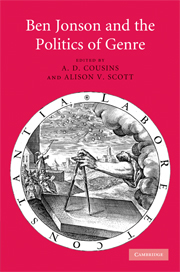Book contents
- Frontmatter
- Contents
- Notes on contributors
- Acknowledgements
- Introduction
- Chapter 1 Feigning the commonwealth: Jonson's Epigrams
- Chapter 2 The Jonsonian masque and the politics of decorum
- Chapter 3 The politics (and pairing) of Jonson's country house poems
- Chapter 4 Style, versatility, and the politics of the epistles
- Chapter 5 Jonson's politics of gender and genre: Mary Wroth and ‘Charis’
- Chapter 6 Jonson's metempsychosis revisited: patronage and religious controversy
- Chapter 7 Jonson's humanist tragedies
- Chapter 8 A generic prompt in Jonson's Timber, or Discoveries
- Bibliography
- Index
Chapter 5 - Jonson's politics of gender and genre: Mary Wroth and ‘Charis’
Published online by Cambridge University Press: 30 June 2009
- Frontmatter
- Contents
- Notes on contributors
- Acknowledgements
- Introduction
- Chapter 1 Feigning the commonwealth: Jonson's Epigrams
- Chapter 2 The Jonsonian masque and the politics of decorum
- Chapter 3 The politics (and pairing) of Jonson's country house poems
- Chapter 4 Style, versatility, and the politics of the epistles
- Chapter 5 Jonson's politics of gender and genre: Mary Wroth and ‘Charis’
- Chapter 6 Jonson's metempsychosis revisited: patronage and religious controversy
- Chapter 7 Jonson's humanist tragedies
- Chapter 8 A generic prompt in Jonson's Timber, or Discoveries
- Bibliography
- Index
Summary
‘Your spacious thoughts with choice inventiones free, Show passiones power, affections severall straines.’
Critics have commented on various connections between Ben Jonson and Mary, Lady Wroth. We know, for example, that Wroth performed in Jonson's ‘Masque of Blackness’, that Jonson wrote commendatory verses to her and dedicated The Alchemist, the only one of the first folio plays to be dedicated to a woman, to her. We know he described her as ‘most aequall with virtue and her Blood: The Grace and Glory of Women’. We know, too, that he is reported to have criticized the behaviour of the man to whom she was married. According to Drummond, Jonson felt that ‘my Lady Wroth is unworthily married on a Jealous husband’. Josephine A. Roberts has also argued for the direct influence of Jonson's masques on various scenes within Wroth's Urania.
Critics, too, have specifically connected Jonson and Lady Mary Wroth with Jonson's poetic sequence ‘A Celebration of Charis in Ten Lyric Pieces’. W. David Kay suggested that Cupid's description of Charis echoes the praise of Wroth in Epigram 105, and Helen Ostovich extends and develops the connections between Wroth, Charis, and Frances Fitzdotterel in The Devil is an Ass, focusing on the transfer of verses from ‘Charis’ to the play.
Aside from arguing for specific connections between Jonson and Wroth that can be deduced from their work, critics have also commented on similarities in approaches adopted by the two writers.
- Type
- Chapter
- Information
- Ben Jonson and the Politics of Genre , pp. 115 - 133Publisher: Cambridge University PressPrint publication year: 2009



